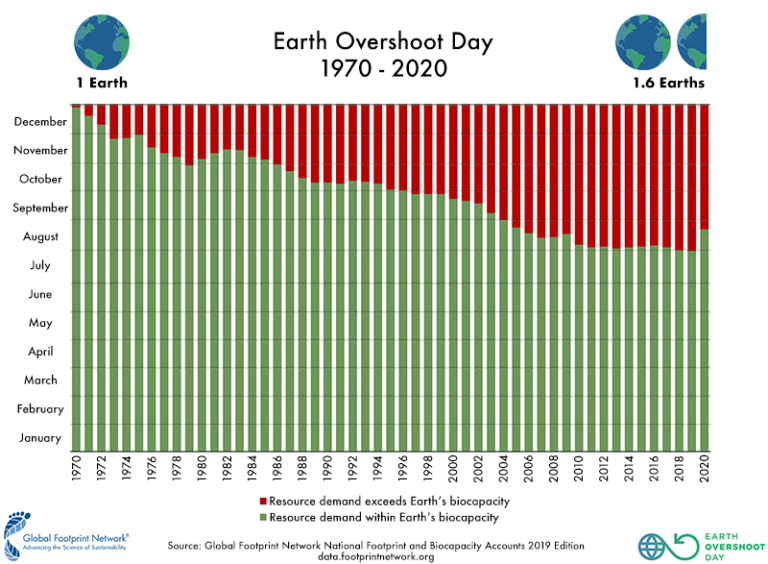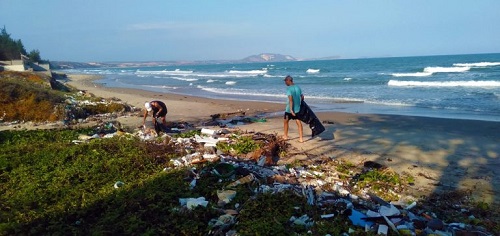This August 22nd is Earth Overshoot Day.
For those unfamiliar with this day, it was established some years ago by the Global Footprint Network (GFN) as a way to visualize that we’re now living off about 1.75 Earths of resources each year. Of course, for many that’s hard to understand. If we’re living off the planet, how can we be overusing the planet? The simplest way to explain is to compare this to one’s personal finances. You can expand your spending by tapping into your savings instead of living off just your income, perhaps even for many years. But eventually your savings will become depleted and you’ll go broke. And in that state, if a crisis occurs—you get sick or your car breaks down, for example, you’ll be in far more fragile, or less resilient, place to afford or address that crisis. That’s what we’re doing with the planet. We are drawing on Earth’s capital rather than using resources at a rate they are naturally replenished and thus we are depleting resources (e.g. deforestation or depleting fish stocks). And we are producing wastes faster than the Earth’s systems can naturally recycle them, thus leading to a buildup of these wastes (like co2 and nitrogen) and in the process leading to threats like climate change and dead zones, and, worse, increasing the chances for a serious disruption (such as runaway climate change) in our future.

Notice back in the 1970s when we had half the people and we consumed a lot less per person, we were using about one planet’s worth of biocapacity. It’s going to take resolve and bold action to get us back to that level. (Image courtesy of the Global Footprint Network)
|
So each year GFN draws attention to this by calculating the day that we shift from using nature’s renewable biocapacity to when we start overshooting it. Last year it was July 29th. This year, in slightly good news, the date is twenty four days later. I say ‘slightly’ as this didn’t happen by design but, as GFN notes, by disaster. The COVID crisis led to a lockdown, which led to a reduction in consumption and travel enough to reduce our collective footprint by about 9 percent (bringing our ecological footprint down to just 1.6 Earths). Which, considering how much the world stood still these past months, isn’t all that impressive. And considering that we need to cut our global footprint almost in half to get to one planet, is really worrisome (particularly as the global population continues to grow and a significant percentage of the human population is vastly underconsuming—with 10 percent not even getting enough to eat—and thus, for justice sake, should consume more).
Of course, if we are going to reduce our footprint to that degree, it’s going to take a radical new path, where degrowth is the active and intentional policy of overconsuming nations. Where public goods are prioritized over private and wealth is better redistributed. And where people get used to living simple lives where joy comes not from their stuff but from how richly they live their lives—in community, and in service to their fellow citizens and to Gaia. But that’s a different essay.
Let’s instead simply talk about what we should do to celebrate/mourn/commemorate Earth Overshoot Day. It’s a somber day—the day we actively start paining Gaia each year (at least symbolically speaking—with how we live, we’re paining Gaia every day). So it seems we should do something somber. Perhaps even a bit uncomfortable and certainly something restorative. (One day, if/when it gets later as we work collectively and intentionally to reduce our impact it might be a day to start celebrating.)
GFN certainly offers a variety of ways to reduce our footprints in how we live day-to-day through its #movethedate campaign—such as reducing meat consumption and food waste (which would move the date 15 and 10 days later respectively), or having one fewer child, which, if every other family did that, would shift the date 30 days later by 2050.
These are important individual solutions (balanced with bolder political and cultural changing efforts of course) but aren’t specific to Earth Overshoot Day. This day is worth observing in some intentional way, certainly more so than so many of the artificially created consumer holidays like Valentine’s Day Or holidays like Columbus Day, which hopefully will soon be turned into Indigenous People’s Day. Or arguably even US Independence Day, which as Code Pink noted this year, “July 4th may be “Independence Day,” but the US is anything but “free.” America won’t be truly liberated as long as it wages endless wars & racist militarized police control the streets.”
So this is my proposal on how to commemorate Earth Overshoot Day:

Hopefully the beach I’m helping to clean up on Overshoot Day won’t be in this bad of shape!
|
First, do a full one-day fast. From the moment you wake until when you wake the next day. No food, no coffee, no tea, only water.* This slight discomfort will help remind you of the discomfort we’re causing to Gaia, of the discomfort of the many who haven’t gotten a fair share of Gaia’s bounty, and of the discomfort to come for all of us if we do not change our ways quickly.
Second, figure out how much you spend on food each day and then donate that amount (what you didn’t spend because of your fast) to an organization working actively to heal Gaia. A local group or global—whatever moves you. And if you can convince others (whether your family, friends, or others in your community) to fast with you—even better—and perhaps you can pool your donations to increase their impact.
And third, during Earth Overshoot Day, if you can, do something restorative. Take a hike and bring a garbage bag with you and pick up the inevitable plastic waste you encounter. Or do that along the streets of your neighborhood (though now more than ever, you should wear a pair of gloves). Or spend extra time in your garden, and perhaps if you harvest a bounty of veggies, share them with a friend or a neighbor. I’m lucky enough that Cinder + Salt, a local eco-clothing store here in Middletown, is organizing a beach cleanup that day. So I just registered for that. That’ll give me a chance, however small, to do something to help Gaia on the day we collectively start to hurt Her.
—
* Drinking water is important, especially if you’re reading this from the northern hemisphere, where it’s summer. If you are going to do a day of service in the hot sun while fasting, it’s important to stay hydrated. Drinking water?—?especially when that’s all we’re consuming and when done mindfully?—?also reminds us that we are part of Gaia’s hydrological cycle, and thus part of Gaia, an important reminder, especially on Earth Overshoot Day.
|
ABOUT THE AUTHOR
Erik Assadourian has been a Senior Fellow at the Worldwatch Institute for 15 years and the Director of the Institute’s Transforming Cultures project since its creation in 2009 with production and publication of State of the World 2010: Transforming Cultures: From Consumerism to Sustainability. Erik is co-author of over a dozen books and an eco-educational board game, Catan: Oil Springs. He is a leading expert in sustainable development, economic degrowth, sustainable communities, consumerism, and cultural change. In his free time, Erik yardfarms and forages edibles where he lives. Erik recently obtained a certification on Sustainable Urban Agriculture from the University of District of Columbia. He is currently writing a book on Gaianism.
|